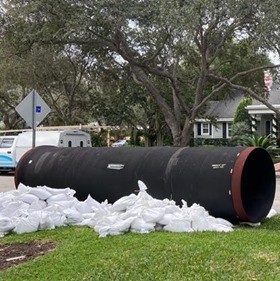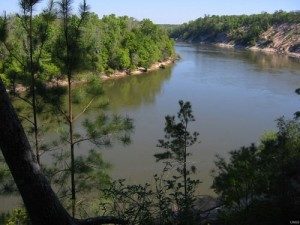Sewage breaks and ocean acidification hitting Florida

A new sewage main replacement pipe awaits installation in Ft. Lauderdale, December 15, 2019
Speaking of infrastructure problems, four sewage lines broke last month in Ft. Lauderdale, flooding parts of neighborhoods and raising the alarm for a more accelerated program of sanitary water line replacements. It’s the latest among a series of serious infrastructure problems facing Ft. Lauderdale and Broward County over the past decade. It tops our list of news in the Environment & Engineering Digest.
Rough Sewer Break: Three back-to-back sewer line breaks in mid-December hit the Rio Vista neighborhood of Ft. Lauderdale, just south of downtown and east of U.S. 1. The 54-inch main sprung a leak and then two days later, ruptured again about a block away. A third break happened the next day in the same line. Published reports say the breaks sent smelly sludge into the Tarpon River, on adjoining streets, and into a neighborhood park.
While crews worked around the clock, sewage flowed for nine days. Just when they thought it was over, a fourth break occurred on December 27 when a 16-inch force main broke at a park. One city commissioner is calling for increased spending to accelerate a planned upgrade of the most susceptible sewage lines in the city known as “The Venice of America.”
Acid Ocean: Last month we reported on a deadly coral disease that’s spreading across the Great Florida Reef from Martin County south now through the lower Keys – specific cause unknown. NOAA is out with a big picture report, noting that carbon dioxide emissions and ocean acidification are occurring at an “unprecedented rate” in the U.S., creating problems from Alaska to Florida.
The report looks at the economies that oceans support, noting that Alaska’s large commercial crab fishery is at risk from ongoing acidification. In the Florida Keys, Puerto Rico and the Virgin Islands, NOAA notes ocean acidification is creating “a great urgency” because of the sensitive coral reef ecosystems and commercially important fisheries, and also impacts tourism.
Coral reefs in southeast Florida generate $4.4 billion in annual sales, $2 billion in income, and 70,000+ full- and part-time jobs, according to NOAA, “much of which will be threatened due to effects on reef-building corals.”

A view of the Apalachicola River. Courtesy, DEP
GA-FL Water Wars: A senior federal judge is recommending that the U.S. Supreme Court reject Florida’s request for an order equitably apportioning water in the Apalachicola-Chattahoochee-Flint river system that flows from Georgia into Florida.
Florida filed suit against Georgia in 2013, claiming Georgia’s water control program along the river system has starved Florida and specifically the Apalachicola River and Bay of crucial water, damaging the oyster industry. Lower court rulings and appeals led to the U.S. Supreme Court initially reviewing the case and appointing a special master to hear both sides and recommend a solution.
LMA Newsletter of 1-6-20

